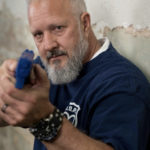D.O.P.E. Spotlight Interview – Ret. Sgt. Rob High
 Spotlight on Rob High
Spotlight on Rob High
A Law Enforcement Legacy
Rob High’s great, great grandfather served as a US Deputy Marshall for Oklahoma Territory — long before the Sooners won their statehood. Two generations later, Rob’s great grandfather served as Sheriff’s Deputy of Shelby County, Tennessee where he enjoyed a 41-year career in law enforcement. With this legacy, Rob seemed destined for a law enforcement career as well. “From the age of seven,” Rob says, “it was one of those things where, when I grew up, that’s what I’m going to do.”
There was only one thing that would keep Rob from following the family tradition: a single encounter with a bad cop. An off-duty police officer wrongly accused Rob and his best friend of doing something wrong, becoming angry and abusive. “It, remarkably, turned me against law enforcement because I thought everybody was like that guy.” Instead of becoming a cop, Rob went to work in the grocery business.
Years later, Rob’s younger brother joined the Oklahoma City Police Department. Rob’s brother often goaded him to join the force, but Rob resisted. After multiple offers to participate in a ride-along, Rob finally relented — if only to get his brother to stop asking. Rob says, “I went and rode with him, and within 15 minutes, it was like everything that seven- year-old me thought it was going to be. They were amazing. These guys are all doing the right thing and helping people and doing a great job.”
Although it meant taking a big pay-cut, Rob eventually followed his heart and left the grocery business to join the force — and he never looked back.
The Importance of Law Enforcement Training
During the course of his law enforcement career, Rob worked criminal intelligence, street gangs, domestic violence, sex crimes, and he ran the Oklahoma City Police Department Academy for a little over eight years. Rob trained 473 officers in nine academy classes, and combined with his continuing education efforts he says, “At the time of my retirement, I had taught absolutely every officer in the police department at some point in time, in some fashion.”
Based on his own experience, Rob knew that law enforcement officers often encounter people during crucial times in their lives. “I made sure that all the cadets I ever taught knew that you can change somebody’s world every single day — and that could be for the good or for the worse, dependent on what that interaction was.” Rob dedicated himself to influencing as many officers as he could to have positive interactions because he knew personally how big an impact a negative interaction could have on someone’s life.
Very quickly, Rob learned that no matter what kind of training a cadet received in the academy, the culture they encountered when first joining the force would strongly influence what type of officer they would become. “If you put a cadet around a strong group of officers that are out there doing the right thing, they can get a good start,” Rob says, “but if you put them around the wrong guys, guys with attitude problems, they can influence new officers to go the wrong way.”
Rob says he’s encountered officers on patrol who have performed contrary to academy training. “I know what they do in the academy,” they’d say, “but this is how we do it on the streets.” It’s an example of why it’s so important for police departments across the country to
identify the officers that are negatively influencing others and get them off the force.
Joining D.O.P.E. the Movement
As a retired law enforcement officer, Rob is very supportive of his brothers and sisters in blue; however, he knows how one bad officer can negatively impact the public’s feelings towards law enforcement at large. When retired Oklahoma City Police Lieutenant Stan Campbell approached Rob about a program designed to improve interactions between law enforcement officers and citizens, Rob felt he could make a difference. The organization Stan founded is called D.O.P.E, which stands for De-escalating Officer Patrol Encounters, and it’s dedicated to educating both law enforcement officers and citizens about how to reduce the tension and anxiety associated with police stops.
Very often, when a citizen encounters a rogue police officer who is acting unprofessionally or abusing their power, the citizen exacerbates the situation by getting upset and arguing with the officer, creating the possibility that an encounter with a poorly trained cop could turn violent. Instead of arguing with an officer on the side of the road, Rob says, “There’s a way to go about dealing with and reporting on an officer that’s operating outside the scope of his authority.”
A smartphone app developed by D.O.P.E. has tools to help citizens report police misconduct. Rob says the vast majority of law enforcement agencies take reports of officer misconduct very seriously and conduct thorough internal investigations, and for those departments that don’t, there are other governing agencies that have jurisdiction. An advanced version of the app allows citizens to record officer encounters, which are automatically uploaded to D.O.P.E.’s private servers and emailed to three of the user’s designated emergency contacts. If a citizen complies with a
bad police officer and then properly reports the incident later, they help law enforcement agencies identify and isolate bad actors, eliminate a negative influence thereby making the streets safer for everyone
 SHAWN VINCENT – LITIGATION CONSULTANT
SHAWN VINCENT – LITIGATION CONSULTANT
Shawn Vincent is a litigation consultant who helps select
juries in self-defense cases, and he manages public interest
of high-profile legal matters. If you have any questions for
Shawn, or would like topic specific articles, please send your
request to dopethemovementinfo@gmail.com attention Shawn Vincent Articles


